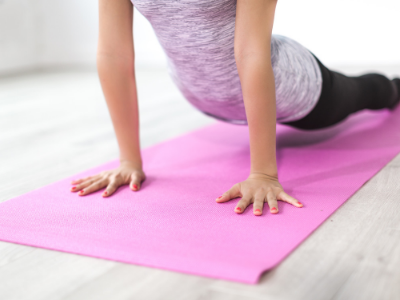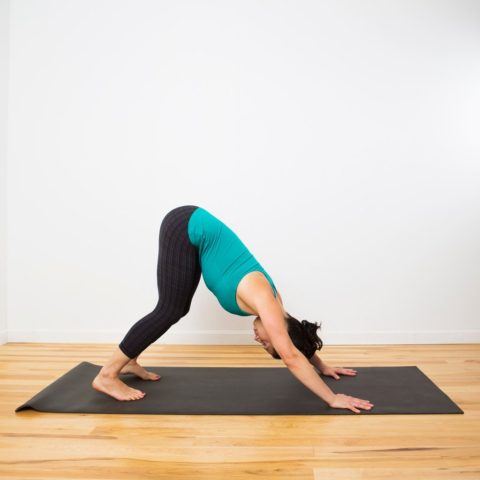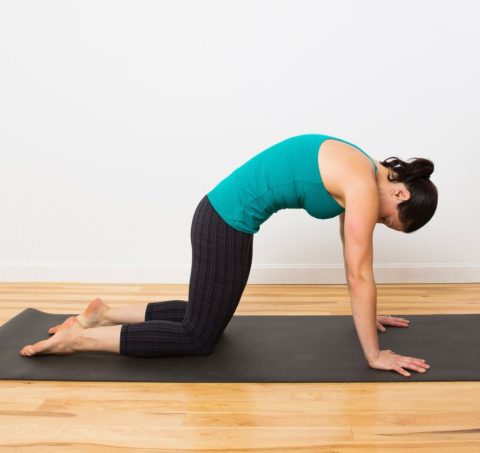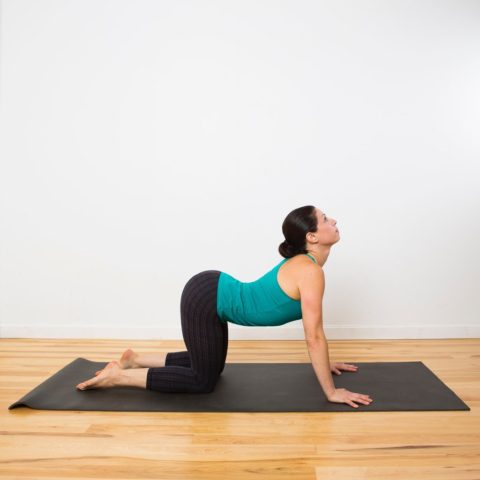 Battling constipation? We’ve all been there. But, before you reach for the over-the-counter remedies, try moving your body to get some relief.
Battling constipation? We’ve all been there. But, before you reach for the over-the-counter remedies, try moving your body to get some relief.
Exercise in any form is essential for your overall health and it is even more essential when you seem to be stuck in a constipation rut.
Yes, you heard that right: exercise can often help relieve constipation. Exercising decreases the amount of time it takes food to move through the large intestine, improving the overall efficiency of the digestive tract. You don’t need to run a marathon or power-lift heavy weights to get the relief benefits of exercise, even the lightest of activity can help get things moving.
Try these exercises to break a constipation rut:
Yoga
Many yoga poses increase blood flow to the digestive tract and can help stimulate intestinal contractions.
Try the Cat-Cow yoga pose:
- Begin with your hands and knees on the floor. Make sure your knees are under your hips, and your wrists are under your shoulders. Begin in a neutral spine position, with your back flat and your abs engaged. Take a big deep inhale.
- On the exhale, round your spine up towards the ceiling, and imagine you’re pulling your belly button up towards your spine, really engaging your abs. Tuck your chin towards your chest, and let your neck release. This is your cat-like shape.
- On your inhale, arch your back, let your belly relax and go loose. Lift your head and tailbone up towards the sky — without putting any unnecessary pressure on your neck. This is the Cow portion of the pose.
- Continue flowing back and forth from Cat Pose to Cow Pose, and connect your breath to each movement — inhale for Cow Pose and exhale on Cat Pose.
- Repeat for at least 10 rounds.
Try the Downward Facing Dog yoga pose:
This position is the perfect yoga pose for constipation because it stretches your entire body and releases tension. This may also help to relieve any buildup in the digestive tract, getting things moving and putting an end to constipation.
- Start all fours on the floor.
- Tuck your toes under and straighten your legs, pushing down through your palms.
- You should be forming an upside-down “V” at this point.
- Keep your feet hips-width apart with your arms a bit wider at shoulder-length.
- Bend the knees very slightly and hold for 10 deep breaths.

There are plenty of yoga poses you can try, so don’t limit yourself to just these two!
Cardio
Aerobics accelerates your breathing and ramps up your heart rate. As you get your blood flowing, the intestinal muscles are stimulated and begin to contact to help move stools out quickly. Any form of cardio is helpful with relieving constipation. Try Zumba, jogging, water aerobics, running or even just light walking. Aim for 30 minutes of cardio daily, but if you can’t fit it in at one time, try mini cardio sessions throughout the day.
Try this 30-minute walking exercise:
- Warm-up: Walk at your normal pace for 5 minutes.
- Main exercise: Pick up the pace, walking briskly for about 25 minutes.
- Cool-down: Bring your pace back down as you finish your walk. Do some gentle stretching to loosen up and relax your muscles.
Here are some other exercises you can try:
- Jogging in place
- Jumping Jacks
- Mountain Climbers
- Deep squats
- Lunges
When to exercise
The best time to combat constipation with exercise is about an hour after a big meal. After eating, blood flow to the stomach and intestines increases, aiding the body in the digestion process. When there is blood flow to the GI tract, there are more digestive enzymes that help move food waste more quickly through the intestine. Digest your food first, then jump into your workout.
Don’t forget the basics
Exercise is a promising way to relieve constipation, but it doesn’t replace the basics. Make sure you stay well hydrated throughout the day and eat a diet full of fiber. Try foods like broccoli, pears, avocado, brown rice, and beans.
Always be sure to talk with your doctor before starting a new exercise regimen. If these daily habits combined with exercise don’t help your bathroom problems, visit your physician to figure out if there are bigger issues causing your constipation.
Dr. Lynn M. O’Connor dedicates her practice to providing the foremost treatment, technology, and information related to preventive public health issues and colon and rectal health. An outstanding surgeon and health advocate, Dr. O’Connor is also the Director of the Women’s Colorectal Care Program for ProHEALTH Care Associates in the Greater New York City area. Click HERE to contact Dr. O’Connor’s office, or to schedule an appointment.
This blog provides general information and discussion about health, medicine, and related subjects. The content provided in this blog, and in any linked materials, are not intended and should not be construed as medical advice. If you have a medical concern, you should consult with a licensed physician or appropriate health care worker. If you think you may have a medical emergency, call your doctor immediately. The views expressed on this blog and website have no relation to those of any health care practice, hospital, or other institution with which the author is affiliated.






